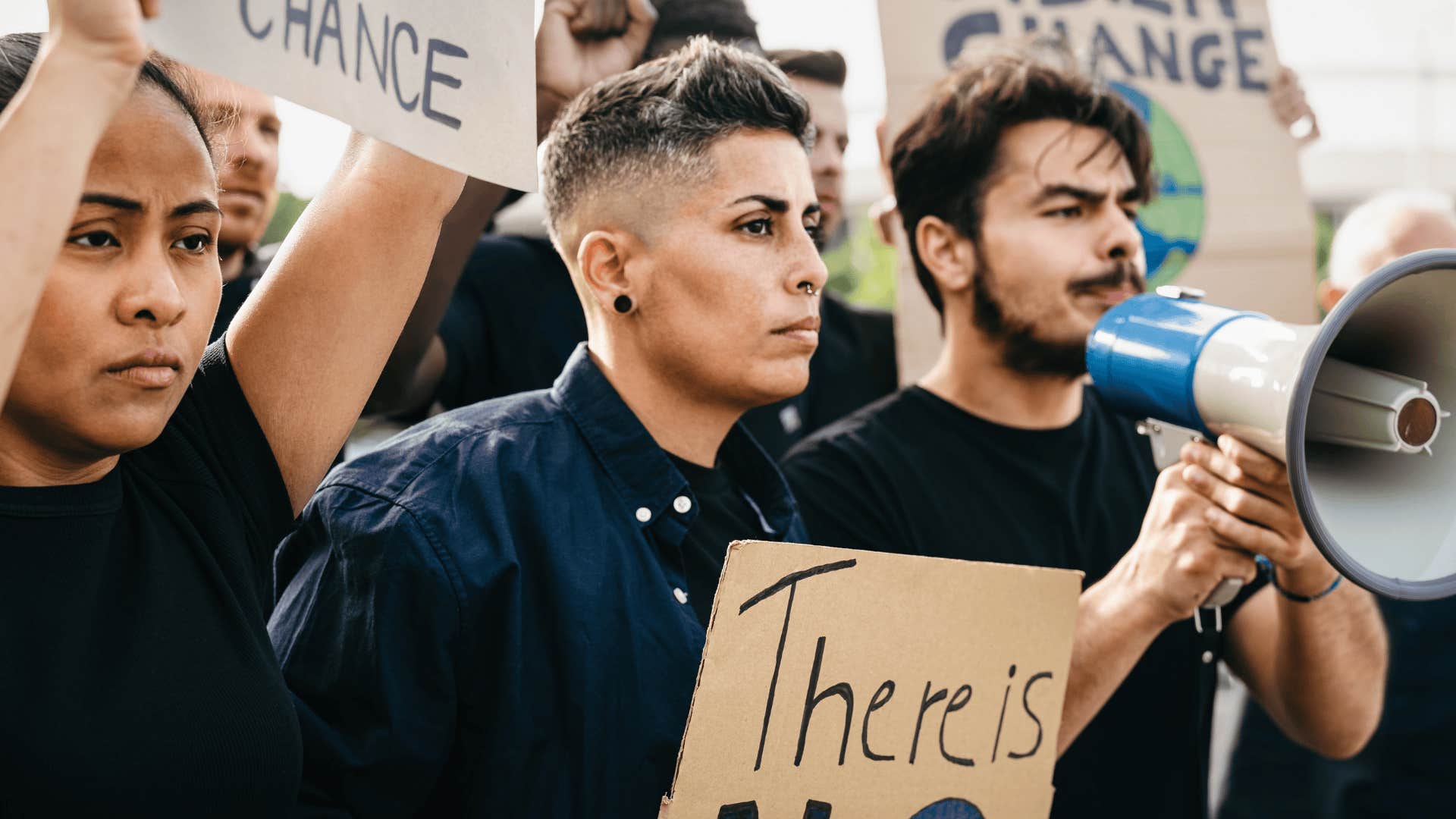11 Things People Wouldn't Be Allowed To Do Anymore If Gen Z Was In Charge
It's no surprise that Gen Z has been coined the "change-maker" generation.
 PeopleImages.com - Yuri A | Shutterstock
PeopleImages.com - Yuri A | Shutterstock While many societal norms and toxic expectations harm everyone in our country, regardless of their age demographic, Gen Z is collectively one of the first generations to challenge them on a large scale. From the workplace, like experts from Stanford University argue, to their personal relationships, online and within society as a whole, they're willing to make a change, finding a more comfortable, healthy, and fulfilling path forward into adulthood.
Many of the things people wouldn't be allowed to do anymore if Gen Z was in charge are also the things they're actively fighting against in their daily lives now. Gen Zers are committed to build a more equitable society for everyone, even if it means enduring the judgment and torment of people in power who have thrived amongst toxic societal standards and norms for decades.
Here are 11 things people wouldn't be allowed to do anymore if Gen Z was in charge
1. Pay unlivable wages to employees
 Gorodenkoff | Shutterstock
Gorodenkoff | Shutterstock
Around 44% of American workers don't make enough money to afford their basic needs and necessities from month to month. Whether it's job instability, low and stagnant wages in their jobs, or trying to compensate for inflation and rising prices, it's clear that economic instability is running rampant for many communities across the country.
However, paying unlivable wages and refusing to compensate workers for their productivity, success, and growth are some of the things people wouldn't be allowed to do anymore if Gen Z was in charge. No longer would there be an epidemic of overworked and underpaid employees.
Everyone deserves to have a job that provides them with a comfortable income and life, whether they enjoy the work and find meaning in it or not.
2. Demonize bridge jobs
 maxbelchenko | Shutterstock
maxbelchenko | Shutterstock
Despite navigating a tumultuous job market where the majority of entry-level jobs require between 2 to 4 years of experience, many Gen Zers are blamed for their unemployment or lacking wages. Called "lazy" or "entitled" for yearning for a livable wage and comfort in the workplace, it's not surprising that they're collectively calling attention to the institutional faults of Corporate America.
It's not just Gen Zers that suffer the wrath of this negative mindset around work – everyone suffers when we demonize bridge jobs, cultivate toxic work cultures, and fear challenging old-school norms that are no longer supportive for the mass majority of workers. Especially when people turning to these bridge jobs — bartending, being a barista, or serving in a restaurant — to support themselves and their families are being judged for doing so, something needs to change.
Of course, this is one of the things people wouldn't be allowed to do anymore if Gen Z was in charge. People wouldn't just have the choice of the kind of industry and job they wanted to work in, they'd feel comfortable knowing they'd make a living either way.
3. Pay for higher education
 Prostock-studio | Shutterstock
Prostock-studio | Shutterstock
According to a 2024 survey on higher education from Lumina and Gallup, college has become too expensive for the majority of Americans, even with certain financial aid programs still up and running. Whether it's middle-class students unable to secure grants and funding, low-income kids struggling to afford extracurriculars, educational support, and college prep, or lacking in-school programs to support college students, higher education has become more unattainable than ever.
Of course, it's not just Gen Z that believes education should be a natural right, as many people acknowledge the societal consequences of disproportionate education attainment and inaccessibility. However, if Gen Z was in charge, college and higher education would be free.
Everyone, regardless of their family's income, background, or community, would have the option to pursue an education — not just the affluent, rich, and already influential.
4. Ignore climate change
 AlessandroBiascioli | Shutterstock
AlessandroBiascioli | Shutterstock
According to scientific experts from NASA, Gen Z's climate activism isn't unfounded — the evidence for rapid climate change in recent years is impossible to ignore. Despite scientific research, climate change has become overly politicized in recent years, weaponized by influential power players who benefit from institutions like traditional energy, fossil fuels, and transportation that also contribute to climate issues.
However, denying climate change and actively working against it for the sake of financial gain are some of the things people wouldn't be allowed to do anymore if Gen Z was in charge. Not only would there be solutions to pave a healthier path forward, everyone would be in agreement on the alarming and unsettling nature of scientific evidence proving climate change.
5. Blame people for their misfortunes
 Studio Romantic | Shutterstock
Studio Romantic | Shutterstock
Especially as they navigate financial hardship, rising housing costs, and rigid societal expectations, it's not surprising that Gen Z is collectively fed up with an accusatory "blame-forward" attitude towards struggling individuals. Whether it's people experiencing homelessness, unemployed individuals, or communities struggling with substance abuse, Gen Z is willing to advocate for people and provide support, rather than blame them for their circumstances.
Most Americans are just one or two missed paychecks away from experiencing homelessness — it's clearly not an individual problem, but an institutional one. Like social activism, racial injustice, or wealth inequities, Gen Z doesn't simply tolerate the system and tradition, they're outspoken about what needs to change, and this blaming attitude is at the top of their list.
6. Give unsolicited advice
 fizkes | Shutterstock
fizkes | Shutterstock
While it may seem inconspicuous in conversations, a study from Psychology and Aging found that giving unsolicited advice can have adverse effects on social connections, relationships, and personal well-being and health. When someone simply needs support, the last thing they want to be met with is a "solution-oriented" approach that dismisses their emotions and present concerns,
Part of the reason why many Gen Zers are experiencing familial turmoil and tensions in their parents' relationship is an acknowledgement about the negative effects of unsolicited advice. They want to be supported, without advice or unnecessary judgment, and unsolicited advice only encourages them to feel unheard.
That's exactly why this is one of the things people wouldn't be allowed to do anymore if Gen Z was in charge. Whether it's in the workplace, at home, or in their intimate relationships, everyone would have the resources to learn how to actively listen and support others in their connections.
7. Feel pressured to maintain toxic parental relationships
 ViDI Studio | Shutterstock
ViDI Studio | Shutterstock
According to Karl Pillemar, a Cornell University professor, 27% of adult Americans are currently estranged from a parent, with the number rising steadily as Gen Z enters adulthood. While it's controversial and largely stigmatized, Gen Z collectively prioritizes their mental health, having open discussions about mental health resources, boundaries, and emotional intelligence.
While older generations might have tolerated a toxic family dynamic or maintained a relationship with an unhealthy parent at the expense of their mental health, Gen Z is largely overturning those traditional expectations, going "no contact" with family members and prioritizing their own wellness.
Of course, cutting off a toxic family member isn't always the only option, but ensuring people feel comfortable doing so under the right circumstances is essential to heal from childhood trauma and build better, healthier relationships in the future.
8. Sacrifice personal well-being for money
 Panitanphoto | Shutterstock
Panitanphoto | Shutterstock
Outside of ensuring employers pay livable wages and provide benefits for their employees, one of the things people wouldn't be allowed to do anymore if Gen Z was in charge is sacrifice their personal well-being for the sake of a job.
Not only would they find purpose, creativity, and meaning in their work — some of the biggest priorities for Gen Z workers — they would feel supported in setting better work boundaries, prioritizing their work-life balance, and advocating for their well-being.
9. Charge unrealistic prices for 'third places'
 DavideAngelini | Shutterstock
DavideAngelini | Shutterstock
Whether it's a public park, an accessible coffee shop, or a library, like a 2023 study from the American Library Association suggests is Gen Z's newest gathering place, nobody should feel pressured to pay unfeasible prices for the sake of community. Having to sacrifice groceries or a utility bill to build social connections is one of the things people wouldn't be allowed to do anymore if Gen Z was in charge.
According to Tumblr and Archrival's "The State of Community" report, many Gen Zers are still yearning for a sense of belonging in their lives. Whether it's finding digital communities online, in-person gathering spaces, or events like concerts, book clubs, and speed dating, Gen Z needs social interaction to fuel their purpose and general well-being.
To best accommodate this desire, both within and outside of the digital landscape, it's essential that "third places" are accessible for everyone. Having the money or a disposable income to spend at a coffee shop or to join a running club shouldn't be the reason why people are able to find community and leverage the benefits of social interaction.
10. Uphold gendered expectations about self-expression
 Artie Medvedev | Shutterstock
Artie Medvedev | Shutterstock
According to a Pew Research study, Gen Z isn't just more diverse than their predecessors, they're also more open-minded when it comes to new-age ideas about gender, self-expression, and identity.
They're more likely than older generations to both identify with and know someone who identifies with gender-neutral pronouns. They're also largely committed to experimenting with self-expression and their appearance, even if it means challenging traditional societal expectations around a rigid gender binary.
Not only would people be free to experiment with their authentic appearance and play around with their self-expression outside the confines of societal norms if Gen Z was in charge, everyone would be more willing to accept the fluidity of gender as a whole. Without overreaching, rigid, traditional expectations, everyone could find comfort in their true identity without pressures or judgment that sparks mental, emotions, and societal turmoil.
11. Feel guilty for taking time off
 Ground Picture | Shutterstock
Ground Picture | Shutterstock
According to leadership coach Tara Kermiet, many older generations — even including millennials and Gen Xers — were raised to believe that hard work was the key to success. This principle not only fueled a rigid "hustle culture," it encouraged people to overwork themselves in hopes of a more prosperous future. However, the truth is, the only thing that mindset cultivates in the modern world is resentment and burnout.
"True resilience isn't just about grit or toughness," Kermiet said, "It's about knowing when to keep going and, just as importantly, when to stop." Gen Z's prioritization of work-life balance and boundaries in their professional lives largely embodies Kermiet's ideals, suggesting that a traditional "hard work pays off" mindset no longer benefits people in the way it did for baby boomers or "the silent generation."
You are entitled to take sick time however you see fit. You shouldn't feel guilty requesting a PTO day or vacation. You're a person deserving of a break, rest, and relaxation, before you're a worker expected to complete tasks and support a company.
Zayda Slabbekoorn is a staff writer with a bachelor's degree in social relations & policy and gender studies who focuses on psychology, relationships, self-help, and human interest stories.

